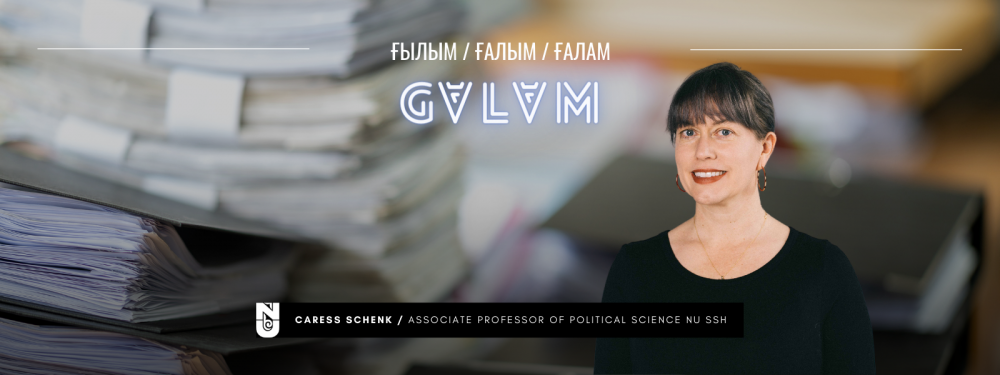Galym-Galam: Сaress Schenk, Associate Professor of NU SSH
A new guest of ‘Galym-Galam’ rubric is Сaress Schenk, Associate Professor of NU SSH. She works on a couple of projects at the moment. One is the international CoronaNet project that many NU students have participated in through internships. It collects data on government decisions related to COVID-19, and according to Dr. Schenk’s research findings, there is a great deal of policy borrowing across the Eurasian countries. In the Crisis, Risk, and Uncertainty project, she is investigating vaccine policies and practices as well as the methodologies used to produce official state data on case-counts, vaccines, and recoveries.
Can you please tell us about your educational and professional background?
I have a PhD in Political Science from Miami University (Ohio) and an MA in International Relations and Comparative Politics from Wright State University (Ohio). I wrote my PhD dissertation on Immigration to Russia and my MA thesis on humanitarian intervention in the case of the former Yugoslavia. My undergraduate degree was in music and I worked as a music teacher and graphic designer for several years before going to graduate school.
Can you please tell us about your current research project?
I have a couple of projects right now. One is the international CoronaNet project that many NU students have participated in through internships. CoronaNet collects data on government decisions related to COVID-19 and thanks to our NU interns, we have a much more comprehensive dataset on Eurasia than any other policy tracker in the world. A second project I have is called Crisis, Risk, and Uncertainty: Managing the politics of fear and the politics of science in the era of COVID-19. In this project, we’re investigating the relationship between political power and public attitudes in Kazakhstan and Russia. A third project is related to my ongoing research on migration in Eurasia, specifically investigating the use and meanings of official data in the politics of migration. In all of these projects, the absolute best part has been working with NU students on my research teams. Working with teams of students has generated amazing ideas, energy, and a sense of community that I am very thankful for.
What are your key research findings?
In the CoronaNet project, we’re finding that in the Eurasian countries there is a great deal of policy borrowing across countries. We’re also seeing a massive amount of devolution of decision-making, meaning the most important decisions are being made by local actors. In Russia, which is a federal system, this is not entirely surprising. But in Kazakhstan we see a similar trend where most decisions are made by akimats and local sanitary doctors. In the Crisis, Risk, and Uncertainty project, we are investigating vaccine policies and practices as well as the methodologies used to produce official state data on case-counts, vaccines, and recoveries. We’re finding that the government goes to an enormous amount of effort to produce these numbers, but that the public very often doesn’t believe the numbers reflect reality. This is related to what I’m finding in my third project, that governments often produce a great deal of official data that reflects small portions of reality, and while the data is not made up it is quite selective and doesn’t present a full picture. Nevertheless, quantified government outputs are extremely important for how governments see their own work and how they justify their work to the public.
Why did you choose to join NU?
I was teaching at a university close to my home after I finished my PhD. I worked with interesting people and the students were great, but it wasn’t a long-term solution for me because I had a heavy teaching load and I knew I wanted to devote more time to research. It made a lot of sense to come to Kazakhstan since my research is on the region and I jumped at the opportunity to leave the US in order to learn new perspectives.
What are your future plans?
I love being at NU and plan to stay as long as I can. Right now my kids are young, but I think eventually they will want to go to college in America and they may need us to be close by. In terms of research, I hope to publish several articles and eventually a book based on the research from my current projects. Political science analysis is slow, though, so I would expect to see the first results of these projects starting only in the next 3-5 years.
Сonsidering your status in academia and your family, is it difficult balancing both spheres?
It is difficult to be a woman in academia in many ways. Women are underrepresented in many academic fields, in departments, and in publications. There are many reasons for this, but one is the mental and emotional labor that many women are expected to contribute for keeping their families together while keeping their career moving forward. It just simply isn’t possible to be a female academic with children unless you have a support system in place. I’m thankful for a spouse who does not expect me to keep the house and kids in addition to my career. He takes the lead on many aspects of caring for our children and keeping the house in order. I think this is not typical, but without this type of support, it’s difficult for women to succeed in a demanding career.


